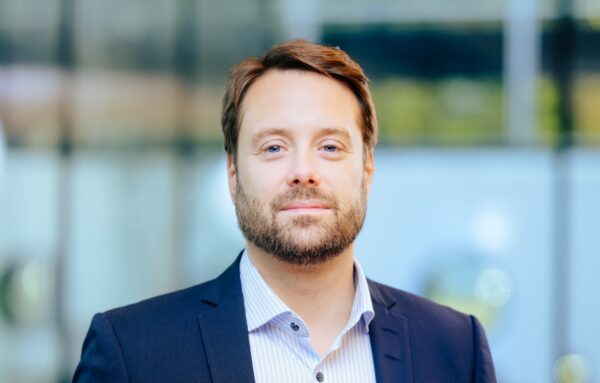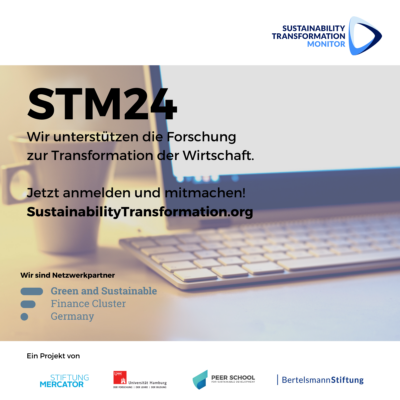Interview with Dr. Manuel Reppmann and Jakob Kunzlmann
The Sustainability Transformation Monitor (STM) is a collaborative project between Stiftung Mercator, the University of Hamburg, the Peerschool for Sustainable Development and the Bertelsmann Stiftung. The STM surveys companies in the real and financial economy on the status of sustainability transformation. By means of a longitudinal survey, it examines, among other things, drivers and barriers to the transformation of business models, as well as opportunities for better integration of the real and financial economies for effective transformation financing. In an interview with Kristina Jeromin, Dr. Manuel Reppmann, University of Hamburg, and Jakob Kunzlmann, Bertelsmann Stiftung, explain the background and provide an outlook on the approaching publication of the STM.
Jakob, the Bertelsmann Foundation is part of a diverse network that launched and supports the Sustainability Transformation Monitor (STM). Who else is involved and what is your goal?
Jakob Kunzlmann: Two major developments took off in the last five. First, it has become increasingly clear that corporate responsibility must be thought of differently than it was from its beginnings in the late 1990s to the mid-2010s. Being a good corporate citizen and taking responsibility beyond the core business is no longer enough to minimize sustainability risks for the economy and society – the core businesses themselves must become more sustainable.
This realization, on the other hand, has given rise to the European Union’s regulatory architecture for a more sustainable economy. The European Green Deal will have an impact as it is successively transposed into national law from now and in the years to come – which, we want to map in an evidence-based way through the STM in the coming years. To this end, we are focusing on sustainability management on the one hand – we are looking into the engine room of sustainability in companies. What is changing, what are the drivers, what is inhibiting the transformation?
On the other hand, the quality of the interplay between the real and financial economy determines the acceptance and amount of private funds that are channeled into more sustainable business models – here we are interested in how the dialogue and interaction between the two worlds look, how optimally are they intertwined and where is there room for improvements?
The STM is a collaborative project of ten organizations that want to shape the transformation of the economy in an evidence-based way over the next few years. This requires reliable data on the “status quo” of the transformation: where do companies stand, what works, where are challenges? The Stiftung Mercator, the University of Hamburg, the Peerschool for Sustainable Development and the Bertelsmann Stiftung are working together in different roles as the operational steering group. We are supported by a broad network of partners. From the real economy, these are the Bundesverband nachhaltige Wirtschaft (BNW), B.A.U.M and the UN Global Compact Network Germany. From the field of sustainable finance, we are supported by the Corporate Responsibility Interface Center (CRIC), an investor community promoting ethics and sustainability in financial investment, and the Wissenschaftsplattform Sustainable Finance. The German Council for Sustainable Development (RNE) supports us in the political connection of the results.
Manuel, you accompany the STM from the conception of the questionnaire to the evaluation of the results with scientific expertise. What is new in the current questionnaire and what can participants look forward to and why is it worth participating?
Dr. Manuel Reppmann: In recent months, we have been actively engaging with the study’s target audience to better align our results with the interests of sustainability leaders within organizations. Alongside our assessment of the current state of sustainability transformation in both real economy and financial sector organizations, we have started data collection this year to explore the interactions between these two realms more deeply. Our aim is to gain a deeper understanding of how organizations can effectively finance sustainability transformation. We, the STM team, consider ourselves service providers for sustainability leaders to help them to successfully manage the topic within their organizations.
The significance of this survey hinges on the number of responses we receive from organizations, so we kindly request everyone’s participation to collectively establish a robust foundation for evidence-based transformation.

As a researcher at the Professorship of Sustainable Business at the University of Hamburg (former at the University of Mannheim), Dr. Manuel Reppmann examines approaches to sustainability transformation of companies in various projects. His research covers topics such as ESG data, materiality analysis, and the interplay between sustainability reporting and sustainability-related organizational change. Manuel is also a strategic sparring partner for companies to assist them in navigating their sustainability transformation journey successfully.
When will the results be available and through which events and platforms will they be published?
Kunzlmann: The results will be published on February 1, 2024 in Berlin and discussed at an event with politicians, business and civil society. Currently, we are in the survey phase and welcome companies to participate.
We will present and discuss a first insight into the results on November 16 as part of the Sustainable Finance Summit Germany. We will stream the discussion live from the Bertelsmann Stiftung Berlin with representatives from the real economy, the financial sector and academia. We will take a slightly different look at the data at the Sustainable Economy Summit in Berlin in mid-December. Here we focus on current developments in corporate sustainability management.

Manuel, can you give us some insights into the medium to long term development of STM – where do we go from here? What role can impact investing play in the transformation towards sustainable business and closing the SDG financing gap?
Reppmann: Our overall goal is to establish the STM as relevant seismograph for the sustainability transformation of German companies. The recurring annual data collection will enable us to better understand the evolution of sustainability transformation over time, with a particular focus on identifying areas where challenges persist. Additionally, we aim to demonstrate how external events and political decisions impact sustainability transformation. We also have initial ideas for an international expansion of the STM in the future, although I cannot confirm when or if this will happen at this time. Currently, our primary focus is on Germany.”
Do you have a favorite question / set of questions and if so, which one and why?
Kunzlmann: I strongly believe, that transforming the economy towards a decarbonized and more sustainable economy is possible and necessary, but the transition comes at a sometimes significant cost for each company. By linking financing instruments for transformation to sustainability criteria, those that get on track and effectively pursue their goals can be rewarded. I think the role sustainability plays in financing discussions is extremely exciting. The more weight given to the topic, the more financing will be oriented toward sustainable aspects of corporate management.
Reppmann: Companies in the real economy currently have a significant need for information and guidance to navigate the complexity of various aspects of sustainability transformation, such as regulatory compliance and the intricate landscape of ESG ratings.
From my perspective, a crucial question is to what extent banks, in addition to their traditional financing role, should and can assist companies in the real economy in this regard. I find it intriguing to understand the expectations that companies have regarding the role of their financing partners and to compare these with banks’ own perceptions of their roles.

